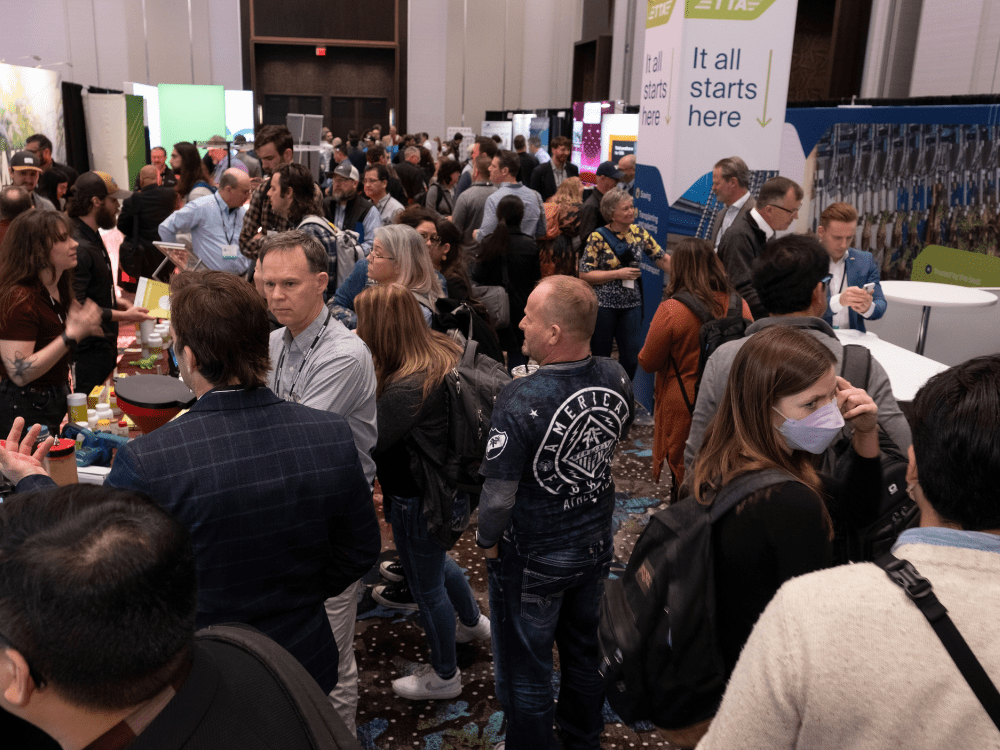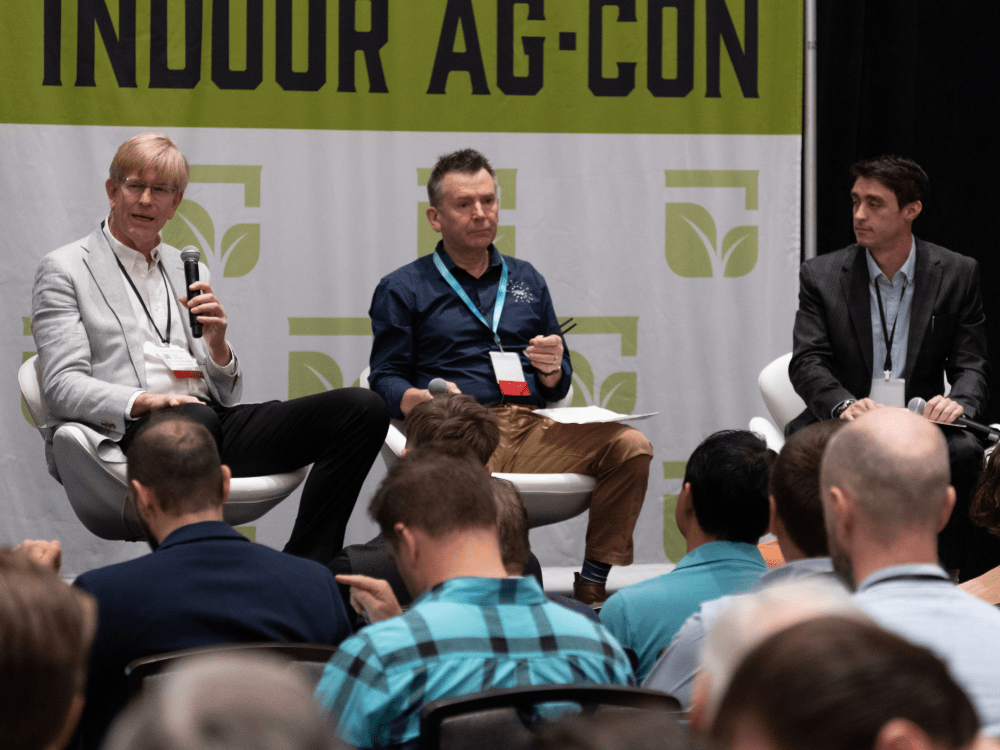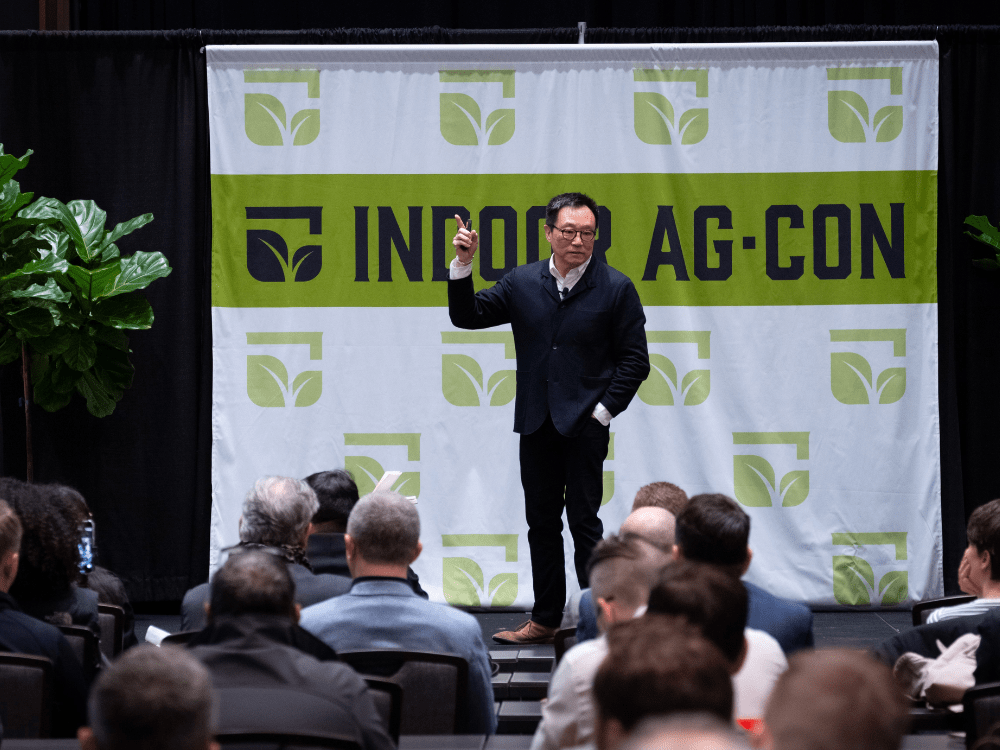According to dozens of attendees at this year’s Indoor Ag-Con, the biggest step indoor farming needs to take right now is towards more collaboration — with one another, with traditional field farmers, and with dedicated technology companies.
This was an important year for the conference, which hosted a record-breaking 1,500 people at the show, a 62% increase on 2022 attendance. Indoor Ag-Con, which took place last month in Las Vegas, also celebrated its 10-year anniversary.
AFN was there from the start. Check out this guest post from its founder back in 2015.
Perhaps most importantly, the two-day conference took place after a year packed with negative news for the segment including company closures, slashed valuations, and layoffs. Every panel I watched and individual I spoke with mentioned these things; most predicted more of them to come in the very near future. More than a few asked where the hundreds of millions of dollars raised over the last several years have gone.

It would be easy to view these troubles and call the struggling sector a failure — especially when it comes to vertical farming.
Instead, attendees mostly chose to focus on what the industry can do to push through the trough of disillusionment, rather than rehash everything that’s gone wrong in the last 12 months. Of course they did!
And to be sure, the show wasn’t 100% free of vague statistics (eg “90% less water!”) and lazy platitudes about being the future of farming. There was also plenty of ego, as usual; several companies on and offstage claimed they were running “the biggest” vertical farm. “Moore’s Law” showed up at least half a dozen times that I recall, and at one point I overheard some growers smack-talking over the size of their respective basil plants.
Those were the exception rather than the rule, however. For the most part, growers, investors and tech companies alike agreed that indoor ag is on a major course correction, hopefully towards a more realistic, honest place and about what we can and can’t do with in greenhouses and vertical farms.
Possibly the most honest statement of the event I heard came from Barry Murchie, CEO of GoodLeaf Farms: “What gets me up in the morning is this cold sweat over another day of doing vertical farming.”
Having established the astoundingly difficult nature of indoor ag, show attendees then spent the bulk of their time discussing two critical components of the future: specialization and collaboration.

‘You need to decide what business you’re in’
“Vertical farming is going to be ruined by people who are trying to ride two horses at the same time and don’t understand either one of them,” the inimitable David Farquar of Intelligent Growth Solutions growled from the stage. [Disclosure: AgFunder, AFN’s parent company, is an investor in IGS.]
He was meant to be engaging in a debate about vertical farms versus greenhouses with Little Leaf Farms founder Paul Sellow. Instead, the two were mostly agreeing on one point: indoor ag companies must decide if they are growers or technologists.
Sellew echoed Farquar’s point in a less poetic yet more direct way: “You need to decide what business you’re in,” he told the audience.
For years, vertical farms — and to some degree, greenhouses — have often tried to be both, designing their own software and robotics systems to use to operate their own massive warehouses growing leafy greens and herbs. Ten years ago, when no one had heard of high-tech indoor farming, this setup made sense. Young industries often must do everything themselves.
Lately, however, the tide has turned, and many are asking (sometimes shouting) for companies to pick one. The argument is that trying to master both will impact the road to profitability because companies can’t earn back the costs of construction, setup, and R&D by selling leafy greens.
Or as Farquar asked onstage, “How many of you know a farmer that built their own tractor?”
Farquar has skin in the game, of course, as IGS is a technology provider for vertical farms, and he frequently makes a point of saying IGS is not a vertical farming company.
But he has a point that’s relevant to an industry struggling with its identity, never mind the profitability problem. He added that “the loudest voices” in vertical farming right now come from brands that are neither growers nor technologists.

‘We need more cooperation’
By far the most-discussed point at the event was collaboration — specifically that indoor agriculture needs more of it.
“I would love to see more collaboration efforts,” Erika Summers, a CEA advisor and mechanical engineer, told me. “Anytime you talk to anybody, there’s an NDA (non-disclosure agreement).”
And yet, she says, all farms have humidity problems. Everyone is still trying to solve the issue of unit economics. More and more companies are trying to grow more than just lettuce. The problems indoor ag is solving for — food security, health, better tasting food, accessibility — are enormous.
Collaboration doesn’t mean forcing startups to part with the kinds of IP and strategies that give them a competitive edge. It’s more about working together to standardize technologies, processes and policies to the benefit of everyone.
By way of example, Summers suggested indoor farming companies come together and ask, as a group, the HVAC industry to build them a system custom designed for a vertical farming environment. “How can we leverage our power to negotiate something purpose-made for this entire industry?”
“Population continues to grow, available resources continue to decline. We need to root for all forms of farming all,” Freight Farms’ CEO Rick Vanzura told me. “All of us can be more sustainable and part of the long-term solution, whether it’s soil, large scale, CEA or last mile solutions. [We need] a lot more cooperation and rooting for each other as opposed to treating everybody as competition.”

‘Stop listening to the hype’
Collaboration applies to investors, too, as does the whole idea of a reality check for indoor farming.
“Investors need to stop listening to the hype,” said Summers. “Farming is not a ‘get rich quick’ thing. Investors need to be educated, and we as an industry needs to hold people accountable for telling the truth.”
Panelists and attendees generally agreed that indoor agriculture needs more “patient” capital provided by investors willing to wait longer on returns. Most likely, it’s also time to look beyond just VC for that capital.
To Summers’ point, the industry needs to spend time educating these investors on how complicated indoor ag actually is, technically speaking and otherwise. Only when the bare facts are on the table for all to see can the industry progress in any meaningful way.
As Farquar noted, “The industry has to grow up, start telling the truth and publish real data.”
“You ever read one of these Silicon Valley new food pitches?” asked Equilibrium Capital CEO Dave Chen during his keynote address. “The first line is ‘8 billion hungry mouths.’ The second page talks about branded goods at a premium. Let me get this right: 8 billion people that we have an obligation to feed but we’re gonna feed them $20 per pound?”
“Feeding the world still means scale, affordable, accessible,” he added.
Finally, he handed the audience what’s arguably the biggest reality check today’s indoor farmers must come to terms with:
“Technology will become a core form of competency and it’s going to pervade everything we do with farming around management, productivity, and sustainability. But it’s important to remember that in farming, technology is a means, not an end.”




